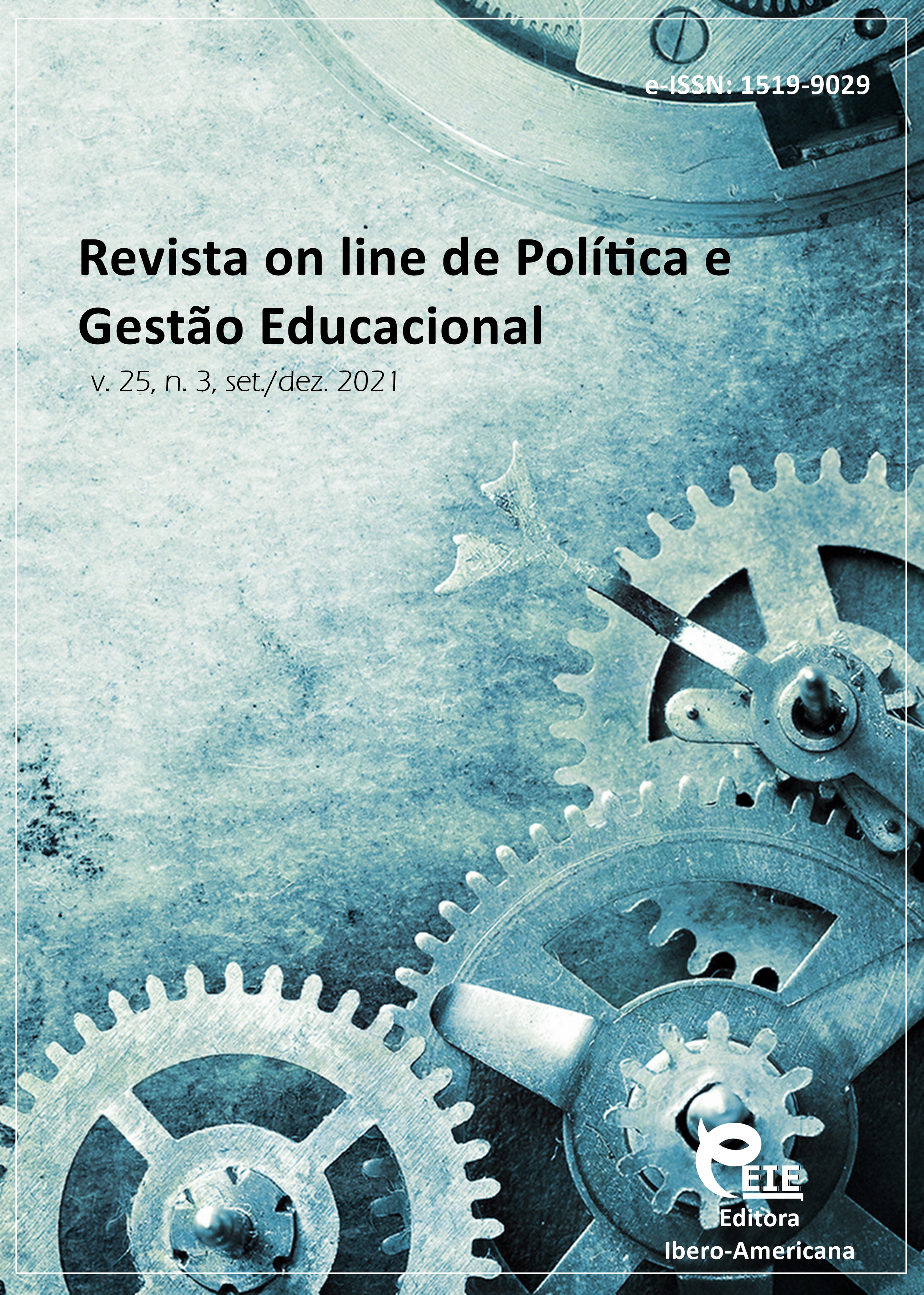Peculiaridades do desenvolvimento do ensino superior em um ambiente de aprendizagem híbrida
DOI:
https://doi.org/10.22633/rpge.v25i3.15959Palavras-chave:
Pedagogia, Aprendizagem mista, AmbienteResumo
Este artigo identifica peculiaridades da transformação da pedagogia do ensino superior através do modelo de aprendizagem combinada. A metodologia baseou-se numa análise estatística e correlacional, utilizando a base de dados do The Teaching and Learning International Survey, contendo os resultados de pesquisa com 7.823 educadores na França e nos Países Baixos. O estudo revelou nível médio de preparação dos professores para a aprendizagem híbrida (50,5%) e para a utilização das tecnologias da informação e comunicação (TIC) na aprendizagem dos estudantes (48,4%). Revelou-se um nível significativo de desenvolvimento profissional em competências das TIC (44% fazem cursos) e estabeleceu-se um nível médio de despreparo tanto para aprendizagem híbrida (28,9% não preparados, 36,6% insuficientemente preparados) como para utilização das TIC na prática (30,3% quase não preparados, 34,25 insuficientemente preparados). Estabeleceu-se correlação positiva entre a preparação dos professores para o ambiente de aprendizagem híbrida e a passagem de cursos profissionais de desenvolvimento em TIC.
Downloads
Referências
ARNESEN, K. T. et al. Experiences with Personalized Learning in a Blended Teaching Course for Preservice Teachers. Journal of online learning research, Waynesville, v. 5, n. 3, p. 275-310, 2019. Available: https://www.learntechlib.org/primary/p/210637. Access: 5 Dec. 2021.
ARNEY, L. Go blended!: A handbook for blending technology in schools. Hoboken: John Wiley & Sons, 2014.
BORUP, J. et al. Academic Communities of Engagement: an expansive lens for examining support structures in blended and online learning. Educational Technology Research and Development, Chestnut Hill, v. 68, n. 2, p. 807-832, 2020. DOI: https://doi.org/10.1007/s11423-020-09744-x
DZIUBAN, C. et al. Blended learning: the new normal and emerging technologies. International Journal of Educational Technology in Higher Education, Barcelona, v. 15, n. 1, p. 1-16, 2018. DOI: https://doi.org/10.1186/s41239-017-0087-5
GRAHAM, C. R. Blended learning models. In: KHOSROW-POUR, M. Encyclopedia of Information Science and Technology. 2. ed. Pennsylvania: IGI Global, 2009. p. 375-382. DOI: https://doi.org/10.4018/978-1-60566-026-4.ch063
GRAHAM, C. R. Current research in blended learning. In: Handbook of distance education. England: Routledge, 2013a. p. 173-188.
GRAHAM, C. R. Emerging practice and research in blended learning. In: Handbook of distance education. England: Routledge, 2013b. p. 351-368.
GRAHAM, C. R. et al. K–12 Blended Teaching Readiness: Model and Instrument Development. Journal of Research on Technology in Education, Gainesville, v. 51, n. 3, p. 239-258, 2019. DOI: https://doi.org/10.1080/15391523.2019.1586601
HRASTINSKI, S. What do we mean by blended learning? TechTrends, Statesboro, v. 63, n. 5, p. 564-569, 2019. DOI: https://doi.org/10.1007/s11528-019-00375-5
LÓPEZ-PÉREZ, M. V.; PÉREZ-LÓPEZ, M. C.; RODRÍGUEZ-ARIZA, L. Blended learning in higher education: Students’ perceptions and their relation to outcomes. Computers & Education, Tempe, v. 56, n. 3, p. 818-826, 2011. DOI: https://doi.org/10.1016/j.compedu.2010.10.023
MANWARING, K. C. et al. Investigating student engagement in blended learning settings using experience sampling and structural equation modeling. The Internet and Higher Education, Hong Kong, v. 35, p. 21-33, 2017. DOI: https://doi.org/10.1016/j.iheduc.2017.06.002
MOSKAL, P.; DZIUBAN, C.; HARTMAN, J. Blended learning: A dangerous idea? The Internet and Higher Education, Hong Kong, v. 18, p. 15-23, 2013. DOI: https://doi.org/10.1016/j.iheduc.2012.12.001
ORGANISATION FOR ECONOMIC COOPERATION AND DEVELOPMENT. TALIS 2018 Results (Volume I): Teachers and School Leaders as Lifelong Learners. Paris: OECD Publishing, 2019. DOI: https://doi.org/10.1787/1d0bc92a-en
PORTER, W. W. et al. Blended learning in higher education: Institutional adoption and implementation. Computers & Education, Tempe, v. 75, p. 185-195, 2014. DOI: https://doi.org/10.1016/j.compedu.2014.02.011
PORTER, W. W. et al. A qualitative analysis of institutional drivers and barriers to blended learning adoption in higher education. The internet and Higher education, Hong Kong, v. 28, p. 17-27, 2016. DOI: https://doi.org/10.1016/j.iheduc.2015.08.003
PULHAM, E.; GRAHAM, C. R. Comparing K-12 online and blended teaching competencies: a literature review. Distance Education, London, v. 39, n. 3, p. 411-432, 2018. DOI: https://doi.org/10.1080/01587919.2018.1476840
PULHAM, E.; GRAHAM, C.; SHORT, C. Generic vs. Modality-Specific Competencies for K-12 Online and Blended Teaching. Journal of Online Learning Research, Waynesville, v. 4, n. 1, p. 33-52, 2018. Available: https://files.eric.ed.gov/fulltext/EJ1174455.pdf. Access: 5 Dec. 2021.
SMITH, K.; HILL, J. Defining the nature of blended learning through its depiction in current research. Higher Education Research & Development, Hobart, v. 38, n. 2, p. 383-397, 2019. DOI: https://doi.org/10.1080/07294360.2018.1517732
SPRING, K. J.; GRAHAM, C. R.; HADLOCK, C. A. The current landscape of international blended learning. International Journal of Technology Enhanced Learning, Geneva, v. 8, n. 1, p. 84-102, 2016. DOI: https://doi.org/10.1504/IJTEL.2016.075961
VAUGHAN, N. Perspectives on Blended Learning in Higher Education. International Journal on E-learning, Waynesville, v. 6, n. 1, p. 81-94, 2007. Available: https://eric.ed.gov/?id=EJ747810. Access: 5 Dec. 2021.
Downloads
Publicado
Como Citar
Edição
Seção
Licença
Copyright (c) 2021 Revista on line de Política e Gestão Educacional

Este trabalho está licenciado sob uma licença Creative Commons Attribution-NonCommercial-ShareAlike 4.0 International License.
Manuscritos aceitos e publicados são de propriedade da Revista on line de Política e Gestão Educacional. É vedada a submissão integral ou parcial do manuscrito a qualquer outro periódico. A responsabilidade do conteúdo dos artigos é exclusiva dos autores. É vedada a tradução para outro idioma sem a autorização escrita do Editor ouvida a Comissão Editorial Científica.











